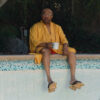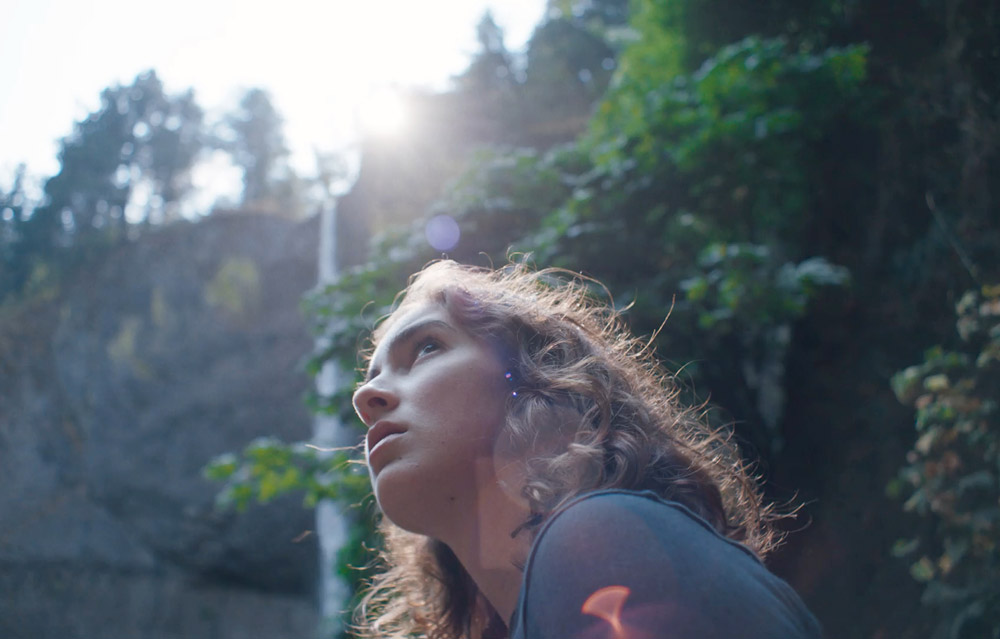At the start of “Sophie Jones,” its title character (Jessica Barr) can be seen opening a gorgeously etched wooden box, which seems like it could hold just about anything in it, a nod to the unexpected that frequently pops up in Jessie Barr’s warm and enchanting directorial debut. That it turns out to hold the ashes of Sophie’s mother explains how gently she handles the box, and the fact she curiously compelled to place a small bit of the remains on her tongue is the filmmaker’s graceful way of showing Sophie is anything but when it comes to figuring out what to do with her grief, a feeling that comes and goes and she can’t ever seem to get a handle on.
It becomes one emotion of many that’s suddenly thrust upon Sophie as a teenager, and in “Sophie Jones,” which just made its debut at the Deauville Film Festival, the Barr cousins, who co-wrote the film before divvying up the acting and directing duties, create something that feels as fresh as the experiences are new to its lead. A drama club kid who doesn’t have much of a taste for it in her personal life — as she puckishly tells a counselor she’s assigned following her loss, “I haven’t been cutting myself or drinking or taking drugs, so that’s cool” — Sophie nonetheless barrels through a series of firsts, all without her mother around to talk through any of it, though she can occasionally lean on a caring father (Dave Roberts), her best friend Claire (Claire Manning) and increasingly Kevin (Skyler Verity), a boy from school with whom her desire to get close to is often frustrated by her need to push much of the world away when pangs of sorrow overcome her.
While Sophie doesn’t know how to contain what’s going on inside of her, the Barrs bring it out beautifully with how “Sophie Jones” constantly feels alive, whether in the impressionistic camerawork of Scott Miller or the naturalism of every conversation Sophie engages in where little epiphanies can be stumbled upon at any given moment. The dramedy had planned to premiere in the city where it was shot earlier this spring at the Portland International Film Festival, before the event was abruptly shut down by the coronavirus. Now like its lead, “Sophie Jones” finds itself navigating uncharted territory as it reenters the world, deserving to be discovered as a true gem, and as it makes waves on international shores, Jessie Barr spoke about how this true family affair came together, making sure the fun that was happening on set made it onto the screen and how the film might now resonate more in a time of collective grief.
How did this come about?
It’s a strange story, so much synchronicity and kismet. I lost my dad to cancer when I was 16 and I had never really dealt with, processed or even spoken about losing him before making this film. One day I was writing and I realized that I had been alive for the same number of years with him that I had been alive without him — it had been 16 years since his passing, I was 16 the year that he died. It was during this moment that I started writing a script that dealt with some of these themes that I had been running from my entire life. But then, in a strange turn of events, my younger cousin who has the same name as me, Jessica Barr — we’re both named after our great-grandmother — e-mailed me an early draft of a script she was working on inspired by her experience grieving the loss of her mother and she asked me for my thoughts and my notes. There was a rawness and an honesty and I saw immediately this world in my mind when I read that early draft and I connected so much to the character of Sophie Jones that I dove in giving her notes, which became her asking me if I would direct and became us writing the script together that would become “Sophie Jones.”
Before making this film, I was not really close with my cousin Jessica — there’s about a 10-year age difference and we lived on opposite coasts most of our lives, but we both share the loss of a parent at 16. She lost her mother when she was 16 [just as I had] lost my father at 16. Both of our parents passed away from cancer, so we share this strange doubling and mirroring of names, experiences and ages. It’s hard to explain but I didn’t feel like it was even a choice to make this film. I had to make it. Making this film was a way for us to take control of our narrative, a way to process our grief and give voice to a shared experience. I felt a huge responsibility to be the person I needed when I was younger, for Jessica, for Sophie, for the film. Looking back on it now I didn’t realize it then but I was trying to save Sophie Jones, I was trying to save Jessica and save myself through making this film. I felt our parents and our 16 year old selves were with us the entire time. It was vital for me to make a film that was deeply personal but would also have universal resonance. The story of the film is inspired by Jessica’s experience grieving the loss of her mother but it is not a documentary or a recreation. It is a scripted narrative, but it is also something else. It’s a film about transforming pain and suffering into art and hope.
You’ve said you actually spent a lot of time with teens in Portland in developing this. What was the process like of getting to an authentic place with the script?
When I was exploring Portland the first few times with my producer Lindsay Guerrero and my cousin Jessica, I fell in love with it. I knew I wanted the feeling of these incredible natural spaces to be woven into the script and into the story and I wanted Portland as a character in the narrative. I felt that Sophie and her family would go to some of these places like the Bridge of the Gods, for example, to remember Sophie’s mother [when] maybe they went there as a family when she was alive and they still go there to connect with her presence. So I crafted the scenes with Sophie’s family in some of those outdoor locations I’d scouted and they became a way to incorporate some of the natural beauty and the deeper resonance of the spirit of Sophie’s mother.
Early on in the casting process, I met a lot of Jessica’s friends who actually studied together at this acting studio in Portland, there are so many talented young actors there. It’s a very small and tightly knit community. Because there was so much vulnerability required of all the actors, I wanted Jessica to feel as comfortable as possible and, in a number of cases, casting people she already had relationships with [to] create something that felt organic. There was already a relationship and rapport there that we could build off of.
I brought Dave Roberts, who plays Sophie Jones’ father, in from L.A., but he’s the only actor who was not from Portland, and everyone else is either originally from Portland or based in Portland. A lot of the actors in the film are first-time actors or it’s their first time acting on camera, so I knew I wanted to embrace the connections that everyone had already and use that to strengthen the character’s relationships in the film. Even though this was not a documentary, I did know that I needed it to be shot in a documentary style, handheld, visceral and immersive and really integrate some of the talent and personalities of the actual kids that I was meeting into the script in a way that was organic and truthful.
I noticed Skyler Verity actually wrote the song he sings for the film – was that something he brought to the table?
Yes, it’s a funny story how that scene happened! He has two songs in the film actually — one he made with his buddy Josh Snider [that] plays super low during the coffee shop scene with Kevin and Sophie at the beginning of the film (like a little easter egg) and I used that same song so you can hear it in all its glory in the credits. It’s so beautiful. I still can’t stop listening to it. The other song is the heart-melting song he sings on camera in the film. When we had rehearsals a few weeks out from shooting, a lot of the actors were in L.A. for whatever reason, so we would have rehearsals at my house and I’d film them with my 5D [camera rolling] and we tried things and worked together and rehearsed scenes. After rehearsals, I took [the actors] out for Mexican food, and between bites of burrito and chips, Skyler mentioned casually that he’s a musician and I was like, “Dude, are you kidding me? You’re just telling me this now?” I had never heard his music. I didn’t even know what he sounded like, but once I heard that I knew I needed to incorporate that into the film in a way that felt organic.
I knew [there would be a] falling in love montage where Sophie and Kevin reconnect, so I thought what a beautiful way to bring them together and to share not only how he in-spires her vulnerability, but to really incorporate his actual skills into the film, so I had him lead her through how to play guitar. Then he ended up singing one of his original songs and I had never heard him sing, so when we were rolling, even if it sounded terrible, I would’ve thought it was amazing because whatever happened would’ve been so pure and perfect in that moment. But the fact that he has the voice of an angel is just incredible. I don’t think Jessica had ever heard him sing either, so she was having this very pure reaction on camera and as Sophie was hearing Kevin for the first time, Jessica was hearing Skyler and it was affecting her and coming through the character. When we were rolling, everyone was just weeping behind the camera and I felt in that moment I’m going to remember this for the rest of my life.
Did Jessica always want to play the lead in this?
Yes, I think there was a moment we spoke about this, what if someone else played Sophie, but truly, no one else could have played Sophie. It’s such a brave and powerful thing what Jessica did, to be so honest and vulnerable in her performance and play a version of herself and go to the places she goes to in this film as an actor and as a human being. It’s powerful. She has an innate ability to convey the truth. I’m so proud of her. No one else could have played Sophie. It had to be her. For so many reasons it had to be her. Part of what I was interested in too was exploring these layers of psycho-drama and layers of a narrative weaving through the film and the making of the film. We shot the majority of the film in her actual childhood home that she grew up in, so a lot of the spaces have this groundedness to them, an authenticity and truthfulness to them. Honesty and truth was the mantra we kept coming back to. For me, it was never a question of, “Is someone else going to play Sophie?” Part of what drew us to make this film is the unhashing of our childhood trauma and working through that with a narrative structure and turning that pain and that experience into art.
One of the other things I loved was the camera’s relationship to Sophie – it’s almost like a dance partner in how it’s connected to her. What was it like to go get that relationship?
Scott Miller, my director of photography, is just an incredible person. He’s like family and originally, he was not the person who was going to shoot this, but I had worked with him on the series I created with my husband called “Om City” and had experienced working with him as an actor, on the other side of the camera. I knew what it felt like to be seen by him in a vulnerable way. He also shot my husband’s feature film “Manhattan Romance.” But somebody else had to drop out because she got a huge movie, which always happens in indie film, and a few weeks before [filming], I’m scrambling and losing my mind. Scott is the bodhisattva, a true curious, empathetic deeply feeling soul and I knew being only a few weeks out, I needed someone I had a shorthand with who could just dive in with me into this with total abandon and I could really trust to hold the space for Jess and all of these actors who were doing really vulnerable work. I’m so grateful he was available and said yes.
I’m honored that he took this big risk on the film because he’s been making movies for a long, long time as a cinematographer and a gaffer, and he took a huge risk to come to Portland. He gave his heart and soul. The film is entirely handheld, so it is physically demanding in every way. Watching Scott dance with the camera and the actors and especially in these very vulnerable moments with Jessica as Sophie is like a beautiful film unto itself. It was so physical and Scott is just incredible. I shared poems and music, reference films and images with him and we’d talk forever about moments and emotional beats and framing and the feeling of the world.
We talked a lot about the visual aesthetic and how we were seeing Sophie and how I wanted it not be connected in any way to the mythology of objectifying women. I wanted it to be such an empathetic partnership between her and the camera and the audience to share the experience that Sophie’s going through rather than comment on it. I remember Jessica and I talking about the camera and this idea that she could just let the camera see her, to be seen — truly seen — especially in moments of vulnerability is such a challenging thing for anyone, so thinking of the camera and the lens as a friend or someone you love and letting them in is something we worked on. [Scott] really went there with her too. He was very vulnerable with all the actors, respectful and so present and dialed in to what was going on. He was always willing to play, to experiment and to risk, just had no ego and wanted to find new ways to explore the cinematic language of the film.
There is some actual dancing in the film too. What was it like to stage all those parties Sophie goes to?
Oh my God, they were insane and so fun! I felt like we all got to connect with our 16-year-old selves again, which is so harrowing and also utterly delightful. The one that sticks out the most to me right now was this very overly ambitious oner I had planned for the cast party. With oners there is this inherent watery, fluid quality that is freeing but also claustrophobic at the same time. You cannot escape, but you are also with the characters in real time, moment by moment, breath by breath and that’s so thrilling. I come from theater too, so for whatever reason, that cinematic language to me is just so intoxicating and also really truthful, but on a really, really low budget film with no time, that’s very hard to do.
There’s the scene [at the first part of the cast party] with Claire and Sophie and they’re falling on each other and then Sophie dances alone with the disco ball and then goes up into the bathroom with Skyler’s character Kevin before she has a panic attack — that was originally all in one, and in post, my editor Naomi Sunrise Filoramo, who is incredible and gave her whole heart to making this film, and I cut up the beginning. But once we got up near the stairs, we knew we needed to stay in the one. I remember the feeling of shooting it with all those actors and everyone just giving it their all every take. If one thing is not quite right rhythmically or something drops or the focus buzzes, you have to start again, so it felt like we’re all in this really incredible energetic space building these moments together, we just kept gathering momentum and specificity and grace. It felt electric. I remember following [our cinematographer] Scott up the stairs and I’m matching his steps watching his monitor and he’s following Sophie (Jessica) and behind me was Zach Kahl, who did our sound. So there’s Zach behind me, behind Scott, behind Jess and we’re all like this organism sweeping up the stairs. We all got so high from it and it just felt magical. It was obviously a huge amount of work for everyone, but you just felt so alive from that and we got it and it’s in the film.
When it’s your first feature, was the experience of directing what you thought it would be?
Honestly, there wasn’t time to even think about it! And because it was my first time making a feature, I didn’t have anything similar to measure it by or compare it to. I knew it would be challenging but I had no idea how magical, devastating and wild it actually would be. It happened so quickly and I just had to go, go, go, [knowing] that there was no room for expectation, fear or doubt. I think my naivete was useful and necessary too in a lot of ways actually. It made me open. The level of will and belief that is necessary to sustain throughout the process of bringing a film to life is hard to describe. I don’t think I realized how much making a film like this takes over your life, your entire being. It has been like a companion for the past two years, every day all day, eat, drink, sleep and dream about it. I’m learning about boundaries!
Working with intense limitations and very few resources can feel crushing when you have some-thing that a group of people are striving for but those limitations can also bring things out of people in weird and wonderful ways — things that you didn’t know were there. I can only speak for myself, but I feel that filmmaking and directing can show you who you are in a strange way.
What I love about directing is how collaborative it is. Connecting with other people and creating with them is the most intimate and life-affirming thing there is. Because we were such a small crew, everyone was doing multiple jobs, everyone worked together with an all hands on deck attitude to bring this film to life. It was so immersive and all-encompassing. It’s so personal and I think everyone who made the film was drawn to it for their own reasons, but we all came together the way we did because something drew us together to bring this film to life. This really was such a team effort. There was so much risk involved and so much work because we’re such a small little engine that could. I don’t think I realized how making this film would change my life as much as it has. I love what Toni Morrison says about narrative, as something “radical, creating us at the very moment it is being created.” I feel that is true for filmmaking and I feel changed after making this film, and my hope is that the people that made this film and see this film will too, even in some small way. Maybe each experience making art and telling stories helps create us as we create it.
When it’s a film about living with grief, I know it’s taken on a different dimension for me as we navigate these strange times, so I wonder if it has for you.
I do feel it has because of what is happening globally. So many people are grieving right now, and we are also reckoning with the fact that our country was founded on suffering and unresolved grief in so many ways. Right now I sense this longing from a lot of people, myself included to be accompanied through our experiences of suffering. This is the truth of the film too — in a way, it’s a film about both witnessing and experiencing grief — and as an audience you are accompanying and being accompanied. I hope people feel seen by this film. I hope it’s a call to normalize suffering and help us move towards conversations about grief as nonlinear and a part of life to be explored — grief as a practice almost rather than something to pathologize or fix. There is often this push to just “get over it” in our culture, as if grief and suffering are things to be avoided or problems to be solved. But there is a lot of transformative power in grief — a lot of tenderness, compassion, and meaning, and in a strange way, it can awaken us to our capacity for joy.
“Sophie Jones” opens on March 5th in virtual cinemas, supporting your local arthouse. A full list of theaters is here.




